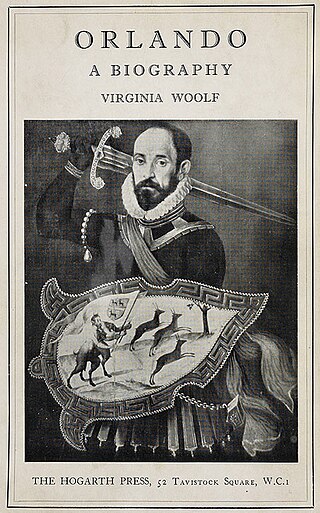Related Research Articles

Victoria Mary, Lady Nicolson, CH, usually known as Vita Sackville-West, was an English author and garden designer.

Sir Harold George Nicolson was a British politician, diplomat, historian, biographer, diarist, novelist, lecturer, journalist, broadcaster, and gardener. His wife was the writer Vita Sackville-West.

Sissinghurst Castle Garden, at Sissinghurst in the Weald of Kent in England, was created by Vita Sackville-West, poet and writer, and her husband Harold Nicolson, author and diplomat. It is among the most famous gardens in England and is designated Grade I on Historic England's register of historic parks and gardens. It was bought by Sackville-West in 1930, and over the next thirty years, working with, and later succeeded by, a series of notable head gardeners, she and Nicolson transformed a farmstead of "squalor and slovenly disorder" into one of the world's most influential gardens. Following Sackville-West's death in 1962, the estate was donated to the National Trust. It was ranked 42nd on the list of the Trust's most-visited sites in the 2021–2022 season, with over 150,000 visitors.

Cyril Vernon Connolly CBE was an English literary critic and writer. He was the editor of the influential literary magazine Horizon (1940–49) and wrote Enemies of Promise (1938), which combined literary criticism with an autobiographical exploration of why he failed to become the successful author of fiction that he had aspired to be in his youth.

Ernest William Beckett, 2nd Baron Grimthorpe, was a British banker and Conservative politician who sat in the House of Commons from 1885 until 1905 when he inherited the Grimthorpe peerage.

Violet Trefusis was an English socialite and author. She is chiefly remembered for her lengthy affair with the writer Vita Sackville-West that both women continued after their respective marriages. It was featured in novels by both parties; in Virginia Woolf's novel Orlando: A Biography; and in many letters and memoirs of the period roughly from 1912 to 1922. She may have been the inspiration for aspects of the character Lady Montdore in Nancy Mitford's Love in a Cold Climate and of Muriel in Harold Acton's The Soul's Gymnasium (1982).

Orlando: A Biography is a novel by Virginia Woolf, first published on 11 October 1928. Inspired by the tumultuous family history of the aristocratic poet and novelist Vita Sackville-West, Woolf's lover and close friend, it is arguably one of her most popular novels; Orlando is a history of English literature in satiric form. The book describes the adventures of a poet who changes sex from man to woman and lives for centuries, meeting the key figures of English literary history. Considered a feminist classic, the book has been written about extensively by scholars of women's writing and gender and transgender studies.
Beard is a slang term, American in origin, describing a person who is used, knowingly or unknowingly, as a date, romantic partner, or spouse either to conceal infidelity or to conceal one's sexual orientation. The term also refers, in some areas, to anyone who acted on behalf of another, in any transaction, to conceal a person's true identity. The term can be used in heterosexual and non-heterosexual contexts but is especially used within LGBTQ+ culture. References to beards are seen in mainstream television and films, and other entertainment.

Nigel Nicolson was an English writer, publisher and politician.

Portrait of a Marriage: Vita Sackville-West and Harold Nicolson is the 1973 biography of writer and gardener Vita Sackville-West compiled by her son Nigel Nicolson from her journals and letters.

Penelope Ruth Mortimer was a Welsh-born English journalist, biographer, and novelist. Her semi-autobiographical novel The Pumpkin Eater (1962) was made into a 1964 film of the same name.
Cathryn Mary Lee Harrison was an English actress.

Weidenfeld & Nicolson Ltd, often shortened to W&N or Weidenfeld, is a British publisher of fiction and reference books. It has been a division of the French-owned Orion Publishing Group since 1991.
Evelyn Graham Irons was a Scottish journalist, the first female war correspondent to be decorated with the French Croix de Guerre.
Alvilde Lees-Milne was a British gardening and landscape expert.

Villa Cimbrone is a historic villa in Ravello, on the Amalfi Coast of southern Italy. Dating from at least the 11th century, it is famous for its scenic belvedere, the Terrazza dell'Infinito.

Long Barn, located in the village of Sevenoaks Weald, Kent, is a Grade II* listed building and a Grade II* registered garden. Reputedly the birthplace of William Caxton, the house was later the home of Vita Sackville-West and Harold Nicolson. During their ownership, the house is also notable for famous residents such as Douglas Fairbanks and Charles Lindbergh.
The Bloomsbury Group plays a prominent role in the LGBT history of its day.
Antony Samuel King-Deacon was personal secretary to Sir Harold Nicolson, a fashion journalist for The Times, and later a gardening author and freelance journalist.
References
- 1 2 Rosenberg, Howard (18 July 1992). "TV review: A Limited Portrait of a 'Marriage'". Los Angeles Times . Retrieved 26 August 2013.
- 1 2 3 Wolf, Matt (19 July 1992). "Love, Infidelity and Commitment in Bloomsbury". The New York Times . Retrieved 26 August 2013.
- ↑ O'Connor, John J. (17 July 1992). "TV Weekend; An Unconventional Marriage, and It Worked". The New York Times . Retrieved 26 August 2013.
- ↑ Scott, Tony (17 July 1992). "Review: "Masterpiece Theatre Portrait of a Marriage Parts I-III"". Variety . Retrieved 26 August 2013.
- ↑ "Awards for Portrait of a Marriage". Internet Movie Database . Retrieved 26 August 2013.